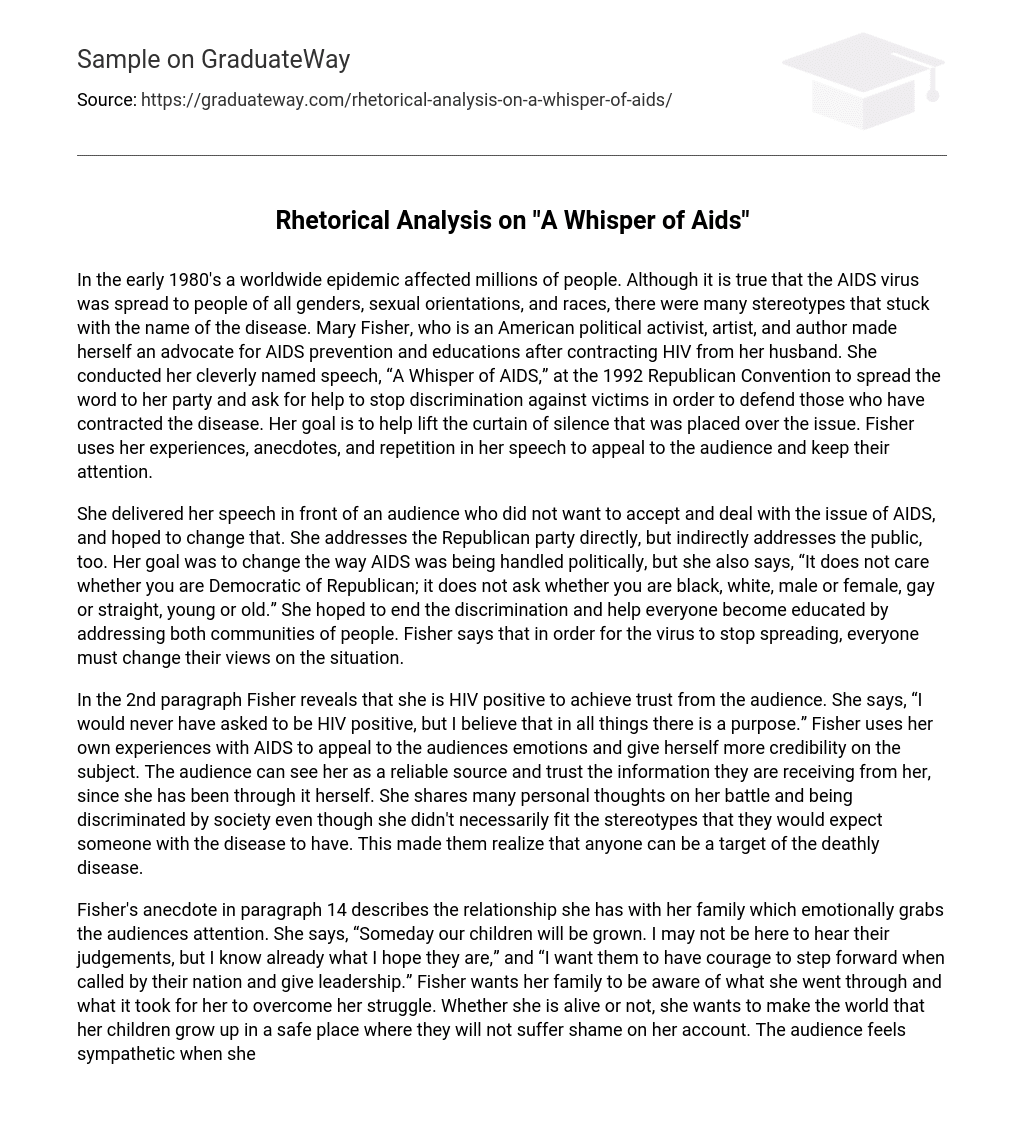In the early 1980’s a worldwide epidemic affected millions of people. Although it is true that the AIDS virus was spread to people of all genders, sexual orientations, and races, there were many stereotypes that stuck with the name of the disease. Mary Fisher, who is an American political activist, artist, and author made herself an advocate for AIDS prevention and educations after contracting HIV from her husband. She conducted her cleverly named speech, “A Whisper of AIDS,” at the 1992 Republican Convention to spread the word to her party and ask for help to stop discrimination against victims in order to defend those who have contracted the disease. Her goal is to help lift the curtain of silence that was placed over the issue. Fisher uses her experiences, anecdotes, and repetition in her speech to appeal to the audience and keep their attention.
She delivered her speech in front of an audience who did not want to accept and deal with the issue of AIDS, and hoped to change that. She addresses the Republican party directly, but indirectly addresses the public, too. Her goal was to change the way AIDS was being handled politically, but she also says, “It does not care whether you are Democratic of Republican; it does not ask whether you are black, white, male or female, gay or straight, young or old.” She hoped to end the discrimination and help everyone become educated by addressing both communities of people. Fisher says that in order for the virus to stop spreading, everyone must change their views on the situation.
In the 2nd paragraph Fisher reveals that she is HIV positive to achieve trust from the audience. She says, “I would never have asked to be HIV positive, but I believe that in all things there is a purpose.” Fisher uses her own experiences with AIDS to appeal to the audiences emotions and give herself more credibility on the subject. The audience can see her as a reliable source and trust the information they are receiving from her, since she has been through it herself. She shares many personal thoughts on her battle and being discriminated by society even though she didn’t necessarily fit the stereotypes that they would expect someone with the disease to have. This made them realize that anyone can be a target of the deathly disease.
Fisher’s anecdote in paragraph 14 describes the relationship she has with her family which emotionally grabs the audiences attention. She says, “Someday our children will be grown. I may not be here to hear their judgements, but I know already what I hope they are,” and “I want them to have courage to step forward when called by their nation and give leadership.” Fisher wants her family to be aware of what she went through and what it took for her to overcome her struggle. Whether she is alive or not, she wants to make the world that her children grow up in a safe place where they will not suffer shame on her account. The audience feels sympathetic when she speaks of not seeing her children grow up and leaving them in an unsafe world. The emotion that this creates leaves a powerful feeling among the audience.
Fisher’s repetition in paragraph 9 emphasizes her point that everyone is at risk through repetition. She says, “If you believe you are safe, you are in danger. Because I was not hemophiliac, I was not at risk. Because I was not gay, I was not at risk. Because I did not inject drugs, I was not at risk.” Through her repetition the audience sees that if the stereotypes were true, she would not have been infected by the disease. Her use of repetition creates a memorable impact on an audience and brings her words to life. It also increases the impact and effectiveness in the key point that she was attempting to highlight. She states, “HIV marches resolutely towards AIDS in more than a million American homes, littering its pathway with bodies of the young – young men, young women, young parents, and young children.” She highlights the fact that young people are dying in our country. Most people are naturally sympathetic to lives being taken at a young age.





